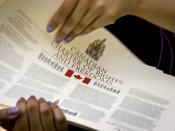Censorship can be defined as the editing of permitted information for the public. To define it is simple, but to explain censorship from a legal perspective is virtually impossible because of the inconsistency of society's views on privacy. In times of comfort, Canadians do not want harsh censorship because of the personal impact it has on their lives. During harder times, however, people become fearful and want to know everything about everyone. Unfortunately, Canadian law has never been able to establish a happy median and this has caused Canada's censorship and privacy laws to be contradictory at best. If all of the accessible information is reviewed, it can be seen that censorship laws are required for ethical reasons but reasonable limits must be imposed to prevent abuse of personal information. This is especially evident in three sociological fields: daily life, Internet communications, and art. Numerous bills have been passed and amendments made but there is still no clear definition of censorship in these areas.
Unknown to many individuals, censorship laws affect their lives on a daily basis. There are abundant amounts of legislation in place to prevent all individual's privacy from being invaded. An example of such would be the Privacy Act of 1974, which censors personal information from public viewing. This act was thought to be absolutely fundamental to a free society and so a Privacy Commissioner (currently George Radwanski) was appointed to protect the public's interests. The original purpose of the act was solely to allow society general freedoms in thought and practise so long as they were not contradictory to Canadian law. This has changed a lot within the last few years through amendments and the changing society Canadians live in. The Privacy Act now specifies precise guidelines to be followed in many different areas. It...


